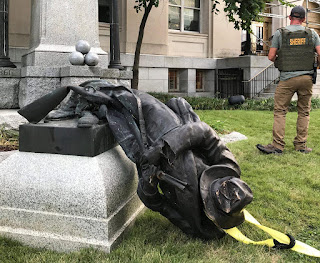


Under the UCMJ, Prosecuting Bales could take Years. Its NO easy process! Especially when a Soldier is Mentally & Physically Diminished.
Lawyer: Bales wasn't drunk and can't remember
The defense of accused murderer Sgt. Robert Bales began Monday when he spent more than seven hours with three of his lawyers, including defense attorney John Henry Browne.
At their meeting, Bales did not confess to the crime.
"He has no memory of ... he has an early memory of that evening and he has a later memory of that, but he doesn't have memory of the evening in between.," Browne said.
Witnesses describe Bales as going deliberately from room to room in several houses while killing people, not in some kind of berserk attack. Browne said that despite the descriptions of his apparently deliberate actions, Bales remembers none of what happened.
Browne also said reports of his being drunk that night were not really true.
"He said he had a couple sips of something but he didn't have a full drink," and therefore he wasn't drunk, Browne said.
Bales told Browne he was in shock.
"He's fixated on the troops left on the ground and what they're accusing him of and how that might have negative ramifications on his friends and compatriots. And he's concerned that there would be retaliation that would be caused by what people think he's done," Browne said.
Bales apparently is eager to get his wife and children on the phone.
"He loves them dearly and he is very interested in talking to them," Browne said.
Browne said he will not seek an insanity defense, rather one of "diminished capacity," like some sort of an emotional breakdown.
Bales is expected to be charged with 16 counts of murder by the end of the week.
The Military Path to Justice Could Be Lengthy
Staff Sgt. Robert Bales has yet to be formally accused of the act that the Army suspects him of committing: the nighttime massacre of 16 Afghan civilians in a village a mile from his post.
But once preliminary charges are announced, as early as this week, the military justice system will proceed deliberately, regardless of the enormity of the charges and the international repercussions of the acts involved.
It is a system devised to be flexible enough to be convened on a battlefield, and broad enough to deal with anything from theft and insubordination to atrocity. Experts agree there will be no quick resolution in this case, especially if the charges carry the death penalty, which Defense Secretary Leon E. Panetta said last week “could be a consideration” in the case.
That, said John Galligan, a military lawyer in private practice in Texas, would mean “it’s going to take several years.”
Many of the early details provided by military sources about the rampage have not been confirmed, and the case could founder in the courtroom on questions of evidence collected under difficult conditions thousands of miles away, potentially with few of the safeguards that courts in both the military and civilian worlds rely on when it comes to building a trustworthy account.
To Eugene R. Fidell, who teaches military justice at Yale Law School, there is still too much to learn for easy conclusions to be drawn. “The narrative has not yet emerged,” he said.
One thing, however, is now certain: Sergeant Bales’s court-martial will be held in the United States. The military on Monday released the transcript of a briefing Sunday with Afghan journalists in which an American official said the case will be heard “somewhere in the United States.” The location, the official said, has not been determined, and witnesses may be flown over from Afghanistan. American service members are not subject to the Afghan criminal justice system, under a longstanding “status of forces agreement” between the United States and the Afghan government.
Sergeant Bales, who is being held at Fort Leavenworth, Kan., met with his defense team for the first time on Monday, in a session lasting several hours. His lawyer, John Henry Browne, told The Associated Press that his client’s recall of that night was patchy.
“He has some memory of some things that happened that night,” Mr. Browne said. “He has some memories of before the incident and he has some memories of after the incident. In between, very little.”
Mr. Browne told CBS News his client said that he had not been drunk, and that he had only had “a couple of sips of something.”
Unless a plea deal is struck, the outcome is anything but certain. The Army prosecuted 44 soldiers for murder or manslaughter of civilians in Iraq or Afghanistan from 2001 to 2011; 30 were convicted of some form of homicide, 6 were convicted of other offenses and 8 were acquitted. No one has been executed under the Uniform Code of Military Justice since 1961.
Gathering evidence and securing the cooperation of witnesses can be bedeviling in far-flung places, and contributed to the collapse of the prosecutions against Marines linked to the killings of 24 men, women and children in the Iraqi city of Haditha. Charges were dropped against most of the Marines who were tried in that case. In another case — the murders of three Afghan civilians in the Maiwand District in Kandahar Province in 2010 by a rogue “kill team” from Sergeant Bales’s base, Lewis-McChord —11 of the 12 soldiers tried were convicted.
The procedures to come are well defined by the Uniform Code of Military Justice and the Manual for Courts-Martial. The rules require a preliminary charging statement to be issued within days of a soldier being put behind bars. That is followed in coming months by a proceeding known as an Article 32 pretrial hearing, where prosecutors will present their evidence for convening a formal court-martial, leading to a recommendation from the presiding officer to higher command authority as to whether to hold a court-martial.
Only after the Article 32 hearing will the determination as to whether to seek the death penalty be announced. The court-martial would then go forward in two stages, one to establish guilt or innocence, and a second to determine sentencing.
Some of the elements of courts-martial differ from trials in the civilian realm. The military justice system does not allow a guilty plea in a death penalty case, but it does allow pleas that will lead to a lesser punishment. A determination of guilt or innocence, and the decision to sentence the defendant to death, must be unanimous.
If the supporting facts that underlie the accusations against Sergeant Bales are borne out and the military seeks the death penalty, much of the work of his legal team will shift to keeping him off death row. In speaking with reporters since the March 11 killings, Mr. Browne has discussed his client’s four combat deployments and suggested that Sergeant Bales could have been suffering from post-traumatic stress and the effects of concussive brain injury.
The military justice system does have the equivalent of the insanity defense, known as lack of mental responsibility, for which the standard of proof is very high. Mr. Fidell said such a defense is rarely successful, though “it could help soften the blow in terms of avoiding the death penalty.”
In the interview with CBS, Mr. Browne said he would not pursue the insanity defense, but would argue that his client had diminished capacity — apparently in an effort to seek mitigation of any punishment.
One issue that could loom large in the case is the risk that statements by those higher in the chain of command can have a prejudicial effect on members of the court-martial, a problem known as unlawful command influence. Among other statements, President Obama has called the killings “tragic and shocking,” and called President Hamid Karzai of Afghanistan last week to pledge that the United States would “get the facts as quickly as possible and to hold accountable anyone responsible.”
Mr. Panetta has called the killings a “criminal act.” When asked whether there was a confession, said, “I suspect that that was the case.”
Jack B. Zimmermann, the co-chairman of the Military Law Committee of the National Association of Criminal Defense Lawyers, said that in high-profile cases, military and civilian leaders were under tremendous pressure to issue statements. “Unfortunately, people in the secretary of defense’s position are caught between the political requirement to make some kind of statement and the danger of what we call unlawful command influence,” said Mr. Zimmermann, a retired Marine colonel. “Somebody should tell him to shut up.”
To James D. Culp, a military lawyer in Austin, Tex., the only question is one of degree. “Is there command influence in the case?” he said. “Undoubtedly. Does it rise to the level of unlawful command influence? We’ll see.” Mr. Fidell, however, noted that while unlawful command influence is often referred to as “the mortal enemy of military justice,” it is “very rare for a case to be set aside” on those grounds.
This court-martial will be closely watched around the world, and that will undoubtedly complicate the prosecution, said Douglas Berman, an expert on sentencing at Moritz College of Law at Ohio State University.
“Every high-profile case, civilian or military,” he said, “takes on dimensions and dynamics that are less familiar and less predictable because there are often interests, both expressed and implied, that transcend resolving this individual case justly. Everything that happens in this case is going to have direct international echoes in terms of the ongoing war effort.”
“Let me put it this way,” he said, “I’m real glad I’m not involved — on either side.”
View Larger Map
Sources: ABC News, CBS News, Daily Mail, NY Times, Google Maps







































































.jpg)























No comments:
Post a Comment